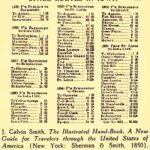 The Beers and St. John Company Coach Inn is locally significant under Criterion A as a relatively unaltered rural example of an early stagecoach inn. Its period of significance dates from 1842, when occupation and construction started, until 1855 when Smith sold the property. It is one of Iowa’s last remaining, rural, heavy timber framed, First Period (1838-1845) stagecoach inns. It also relates to and overlaps Iowa’s Second Period of stagecoach hotels and inns (1846-1863). During its period of significance (1842-1855) the site was the focus of local and regional communication, transportation, and commerce.
The Beers and St. John Company Coach Inn is locally significant under Criterion A as a relatively unaltered rural example of an early stagecoach inn. Its period of significance dates from 1842, when occupation and construction started, until 1855 when Smith sold the property. It is one of Iowa’s last remaining, rural, heavy timber framed, First Period (1838-1845) stagecoach inns. It also relates to and overlaps Iowa’s Second Period of stagecoach hotels and inns (1846-1863). During its period of significance (1842-1855) the site was the focus of local and regional communication, transportation, and commerce.
The inn is the only building remaining from that period on the property. Its context is related to its construction and occupation by Egbert T. Smith specifically for use as a stage inn and tavern built expressly for the purpose of providing a staging inn for the Beers and St. John Company, which had won the federal mail contract in 1842 for the Bloomington (Muscatine) to Iowa City Route.

The inn maintains a high degree of the seven aspects of integrity. Its location is original. Its late Federal design is unchanged. The setting is the same size and retains its landscaping. The materials consisting of brick, stone, and wood are original. The hewn timbers, handmade bricks, and quarried stone as well as the fine woodwork shows its workmanship. The feeling of a territorial era stagecoach inn is present in it floor plan, large chimney, exterior coach mounting mounds, wells and other features. Its association with the old stage route (U.S. 6) and its entry lane location are unchanged. With the arrival of the railroad in Iowa City in 1855, passing just two miles to its north, the site’s use as a stagecoach inn and staging point ended and marks the end of its period of significance under Criterion A.
The significance of the Beers and St. John Company Coach Inn lies in its relationship to Iowa’s first period of stage coaching (1836-1845). Coach inns from this period, especially from the first years relating to the 1830s and early 1840s, are very rare in the state. Also, the size, quality, and integrity of the resource for the period are remarkable. The entrepreneurial spirit of Egbert T. Smith, William St. John, and Robert Stewart reflect both the formative nature of the state and also its relatedness to the mail route and staging movement from the East.
The Beers and St. John Company Coach Inn was listed on the National Historical Registry on February 10, 2016.
















